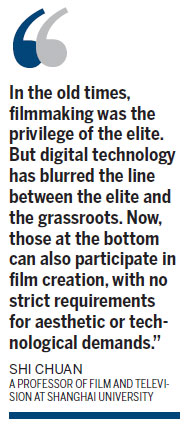

 |
|
Zhang Rui (front) shooting his first microfilm entitled Glass Tank in Gubei town, an old mountain town in Anhui province. Zheng Jinqiang / for China Daily |
 |
|
Huo Siyan leads in Father, the Chopsticks Brothers' follow-up to Old Boy, which became an Internet sensation in early 2010, and kick-started a cultural phenomenon known as "microfilms". Apple for China Daily |
 |
|
Zhu Yuchen (left) and Zhang Jingchu in a scene from the quartet of works produced by the Hong Kong-based filmmaker Ho-Cheung Pang. Provided to China Daily |

Emerging genre is the new darling of advertisers, but that may change the plot, reports Raymond Zhou.
Acouple of school buddies share many hobbies, including a love for music and a secret passion for the same girl. One of them teaches himself Michael Jackson's signature moonwalk. However, once they leave school, they have to make do with reality. One makes a living by hosting weddings, while the other becomes a barber.
The teenagers grow into middle-aged mediocrity. But they have never given up on their dream of making it big. They team up to compete in a singing contest, one plays the guitar and the other reprises the moonwalk. They sing of "life as a ruthless knife that changed our looks, of flowers that withered before they had a chance to bloom, and of youthful days that galloped by without saying goodbye, leaving us deadened and bloodless".
This is the plot of Old Boy, a 43-minute film that spread like wildfire on the Internet in early 2010, attracting tens of millions of viewers and inadvertently kick-starting a cultural phenomenon known as "microfilms".
Short films have existed since the late 19th century when the medium was invented. But what distinguishes microfilms from traditional shorts, as they are known by the professionals, is the distribution platform. These films are not meant for theatrical release. Instead, they are made with the desktop or mobile screen in mind.
The sudden popularity of microfilms attests to the wide use of technology, which "enables people to get information on the go and piecemeal", says Yu Xin, a film critic. "The trend is going in the direction of information fragmentation, dumbing down and acceleration." In that sense, a microfilm is like a video tweet, to be posted online and passed virally from gadget to gadget.
Fast track to success
Old Boy clicked with the public mainly because the story epitomizes the dashed dreams of many who grew up in the 1980s and 1990s and are now the mainstay of China's online demographic. The fact that the two filmmakers were aspiring, struggling artists helped cement the perception that microfilms, like televised singing contests, are the poor man's fast track to success.
Xiao Yang, 32, graduated from the famed Beijing Film Academy, but he majored in advertising and has been in that business ever since. Wang Taili, 42, tried to break into the music business. Calling themselves the "Chopsticks Brothers", they started making microfilms in 2007. Old Boy was originally conceived as a music video for an end-credit song, but they fleshed out the plot and made music-making the climax of the story. The duo also starred in the film.
Given their backgrounds, it's not surprising that Old Boy has high production values, with fluid and dexterous editing and direction. Sadly, most of the 50,000-plus microfilms uploaded in China in 2010 (a figure provided by Weng Jie, a Tudou executive), don't match this level of professionalism.
An increasing number of people have realized that we are entering a golden age of video creation: The wide availability of home camcorders and the ease with which editing software can be used means that non-professionals can now express themselves with video almost as easily as with words. The democratizing technology is breeding a new generation of filmmakers.
"In the old times, filmmaking was the privilege of the elite. But digital technology has blurred the line between the elite and the grassroots. Now, those at the bottom can also participate in film creation, with no strict requirements for aesthetic or technological demands," commented Shi Chuan, a professor of film and television at Shanghai University.
Like shorts in Western countries, microfilms are seen as a training ground for aspiring feature filmmakers. The program that funded Old Boy was sponsored by Youku, a video website that recently merged with its biggest competitor Tudou, and China Film Group, which uses the platform to scout for new talent.
However, the pros soon took over. Shortly after Old Boy became a hit, the online media company Sina sponsored a quartet of works produced by the Hong Kong-based filmmaker Ho-Cheung Pang and starring big name actors such as Zhou Xun and Shawn Yue. Sina's rival Sohu launched a project that gave seven film stars their directorial debuts. Last year, Youku launched another series called 59 cm of Happiness, in which six celebrities from non-film backgrounds were given the opportunity to display their potential.
Meanwhile, microfilm competitions and awards have been cropping up faster than bamboo shoots after a spring shower. "There are more than a dozen such events already," said Hou Zhihui, creative director for Funshion, a film website that claims a global audience of 120 million. "Many name directors like Feng Xiaogang serve as presidents for these events. Access to such celebrities has become the raison d'etre, rather than the means of discovering talent." (Full disclosure: I sit on the juries of the Tudou Festival and FIRST Youth Film Festival, among others.)
The least commercial of these programs may be that run by Cui Yongyuan, which selected 10 people to participate as assistants in upcoming productions by renowned filmmakers. The program is made possible by donations from Cui's friends. Cui, an eminent television personality with a zeal for chronicling and preserving China's film history, wants to discover and train the next crop of "Chinese film masters". Each applicant had to submit a five-minute microfilm entitled New Year. "They interpreted it (the title) in whichever way they saw fit," he explained.
"Cui's program could be the purest," says Funshion's Hou, who produced Father, the Chopsticks Brothers' follow-up to Old Boy. "Microfilms should belong to those with potential."
Revenue generation
Microfilms may generate a large number of Internet hits, but they are hopeless at generating revenue. China's online population has an aversion to paying for digital content and that means commercial sponsors have become involved.
Most websites fund their microfilm programs with money from advertisers, such as Youku partnering with the electronics company Philips or Sina with Samsung. The advertisers get their money's worth through product placement.
As China's regulators crack down on television commercials, limiting their running time, the number of spots available has been greatly reduced and rates have shot up. Meanwhile, television viewers are migrating en masse toward the Internet, where their favorite soaps are streamed without any technical or commercial hiccups or a weeklong wait for the next episode. Chinese advertisers have found a new niche in the form of online microfilms.
Websites also have an incentive to embrace microfilms, because television shows that used to charge a nominal licensing fee have greatly increased their prices.
A typical work can cost as little as 10,000 yuan ($1,600) or as much as 1 million, according to Hu Ge, whose short film The Bloody Case of a Steamed Bun, a 2006 spoof of director Chen Kaige's epic movie Promise, is considered a precursor to the current wave of microfilms.
The Orange Hotel chain spent 30,000 yuan on its first advertising film, which took one week to produce. The five-minute film was watched 400,000 times in the week it was uploaded and was forwarded 10,000 times, said Chen Zhong, the chain's marketing manager. The hotel's whole series of 12 shorts cost no more than 1 million yuan.
Statistics like this have prompted many companies to jump onto the microfilm bandwagon. But they are also driving most works into the realms of the unwatchable. "Even television commercials can be made interesting," lamented Ho-Cheung Pang, who has been a juror at the Tudou Festival three times. "But so many microfilms look so cheap with their commercial messages and images."
Many advertisers insist on prominent product placements, stipulating details such as each character must be given a close-up shot, holding the product or repeating its slogan. The intrusive commercialism has upset many Chinese viewers. The Beijing News recently described the future of the microfilm as being "hijacked" by advertisers. The Southern Weekly summed up its fate as "born in parody and dying in an overkill of commercials". Hou Zhihui of Funshion said too much advertising is simply "smothering" the genre.
"The microfilm is a Chinese-style gimmick," said film director Zhao Tianyu. "Advertisers want to enhance the appeal of their commercials and websites need a nifty name. It has a story, acting and details, so it should be more alluring."
But the genre may falter before it grows to maturity as it falls victim to a vicious circle. You need money to make a good movie, money that only advertisers are willing to put up. But once the advertiser's intent is incorporated, it generally downgrades the quality of the movie, making it less appealing and also less effective as advertising. Consumers are quickly losing interest in this new form of entertainment, said Ling Ping, a producer and also an editor with an advertising publication.
Huayi Brothers, a heavyweight film and television production company, recently announced that it will partner China Telecom in launching a pay-channel for microfilms. But not everyone is bullish about the prospects for revenue.
Meanwhile, the Chopsticks Brothers are still reaping the rewards from their knockout movie. A stage version of Old Boy will come to Beijing in June, and a television series is also in the pipeline. More importantly for them, their debut feature film is in the works.
Contact the reporter at raymondzhou@chinadaily.com.cn